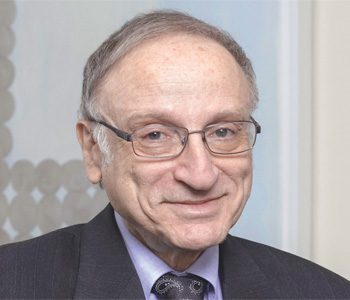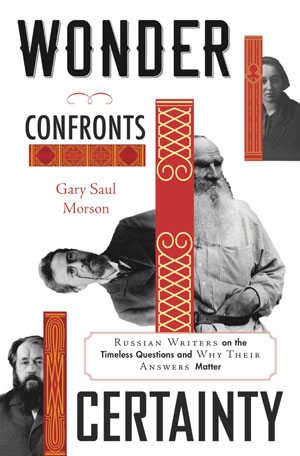
Wonder Confronts Certainty introduces readers to the especially intense Russian debates, over the past two centuries, on the ultimate questions of life. As Virginia Woolf and others noted when the great Russian classics began to be translated, Russian writers forthrightly address questions that “refined” Western writers usually left implicit. As Woolf said, the hero of all Russian literature is “the soul.” Russian literature asks:
1) Does life have a meaning? We often think of the purpose of life as individual happiness, but might that idea be rather shallow and self-indulgent? Isn’t there something beyond our own satisfaction? If so, what might it be? When we come to die, what would make us feel that our life has been worthwhile?
2) If, as many people believe, everything in the world is governed solely by the laws of nature, and nothing else beyond this material world exists, then are ideas of right and wrong mere social conventions? As a Dostoevsky character expresses this view: “if there’s no God, all is permitted.” Is that correct, and if not, why not? Or do moral norms have an absolute value?
3) How do people, as individuals and groups, avoid taking responsibility for what they do? Or, as one Russian thinker expressed the point, what “alibis” do we construct for our failure to do what we should? In the Soviet period, people who tortured and murdered the innocent did so because (they thought) the higher wisdom of the Party called for it. Or they said it was not they themselves who were doing these terrible things, but the forces of History (“history” understood not just as what happened but as a force in itself). In our individual lives, we often blame fate, or our disadvantages, or social conditions, or many other factors for our failures and crimes: but do such factors entirely exhaust our capacity to choose?
4) Is everything predetermined, or are there real alternatives, so that, if the same situation were exactly repeated, something else might happen? Do chance and choice really exist? Is the path of history given in advance, or can we choose different paths? Perhaps, as determinists suppose, living resembles reading a novel, where the ending is already written down even if we are still in the middle of the book? If so, do our choices really matter? Why agonize at foregone conclusions? Do collectives – nations, ethnic groups, social classes, civilizations – have their own pre-established destiny? If not, if the laws of nature do not specify a single outcome, where does the “free play” allowing for different possibilities come from?
5) What events define life – the few great ones we all remember and that historians record, or the sum total of the countless, infinitesimally small events that make up our lives? Is life fundamentally dramatic or prosaic? Perhaps the great events are themselves the product of the innumerable small events? Tolstoy insisted that our memories retain only the few remarkable events and so create a false picture of life because what really define us are what he called the “tiny, tiny alterations” of consciousness we do not even notice, but which his novels describe. The fact that countless people have remarked on Tolstoy’s amazing realism – that, as one writer expressed the point, if nature could write directly without a human intermediary, it would write like Tolstoy – suggests he understood something fundamental. If social scientists understood life as well as Tolstoy, they could create a picture of a person as believable as Tolstoy’s Anna Karenina – but no one has come close!
These and other ultimate questions characterize Russian literature and thought, and the book introduces readers, including those who have not read Russian or any other literature, to the profound answers Russians have given.
Russians are famous for taking ideas to the extreme and then acting on them. That is why they created totalitarianism. Russian thinkers before Communism also tended to take ideas to the extreme, and so they show us the implications of the theories we entertain. That is why, even before the Revolution, Russia was the first society where terrorism became an honored profession. (It also created the genre of the prison camp novel and the dystopia.) Soviets were so convinced their ideology was right that they were willing to destroy tens of millions of lives.
In reaction to this thinking, the great writers insisted that we can never be so certain. We live in a world where our theories about society and morality prove too simple in light of experience. The realist novel, as the Russians practiced it, became a genre expressing the irreducible complexity of things. People never exactly resemble each other or conform neatly to theories. The situations in which we make moral descriptions are far more complex than the paradigm cases that the law or social norms presuppose.
The proper relation to the world is therefore not absolute certainty but endless wonder. We should always be skeptical of our own most cherished beliefs, especially those that warrant our being cruel to others. Soviet communism shows us what happens if we don’t.
While Soviet experience showed us evil – subsequently repeated in Nazi Germany, Mao’s China, Polk Pot’s Cambodia and elsewhere – on a previously unimagined scale, Russian literature explored the nature of evil and why people are drawn to it. Often enough, those who commit these crimes think they are saving the world, but the writers show, nothing causes more misery than attempts to abolish evil altogether. It isn’t true that the line between good and evil runs between nations, political parties, or any other social groups, as self-righteous political fanatics presume. No, as novelist Aleksander Solzhenitysn famously concluded from his own experience in the Soviet forced labor camp system, the line between good and evil “runs through every human heart,” including our own.
I came to this project from a lifetime of reading the great works that pose the ultimate questions. Isn’t life too short to postpone asking them? I wanted to help others sense their importance for the way they live.
The book’s introduction and conclusion offer a real taste of how it proceeds. In the introduction, I first describe an ancient literary form that served as my model. Called “the dialogues of the dead,” it imagined conversations in the underworld of thinkers or heroes who lived centuries apart, but who can now meet to discuss the ultimate questions of life. This form has been practiced up to the present: What would Socrates say to Shakespeare, or Caesar to Napoleon? My book imagines such conversations about the ultimate questions of life conducted by Russian writes and political figures as if they could address each other directly. I view the Russian experience – and life in general – as a great conversation, a symposium extending over time.
The introduction also shows readers how intense Russian literary creativity in the nineteenth century was – there has never been a period where more geniuses wrote in such a short period – in order to have my readers share a sense of how exciting that time was.
The conclusion returns the reader to the dialogic sense of life and examines the need for self-questioning, wise laughter, and the willingness to listen to those unlike ourselves.
My readers could also just turn to chapter 11 on the meaning of life – “What Doesn’t It All Mean? The Trouble with Happiness” – to get a taste of the sort of questions the book addresses.
Most of my students have not been taught great literature in a way that makes them want to read more. Sometimes it is presented technically – let’s find symbols! – or judged by the standards of today (Shakespeare didn’t know about recycling), as if we are wiser than the great writers of the past. I want this book to help people appreciate what great literature can show them, why there is no better place to learn empathy than with those who think or feel differently, why it offers ideas about love, death, moral decisions, and other matters we are all concerned with, deeper and wiser than are available elsewhere.
Russian literature does all this explicitly. Russian experience also shows people the implications of ideas or attitudes – especially those of which we are all too certain! – that seem good but in practice cause untold misery. Today, when technology gives people power over each other they never had before, the need to have a wise understanding of people and moral concerns is even more important than before.


Gary Saul Morson is Lawrence B. Dumas Professor of the Arts and Humanities and Professor of Russian Literature at Northwestern University, where his course on Tolstoy and Dostoevsky has enrolled over 500 students. He is author or editor of 21 books addressing the great Russian writers, the nature of time, the role of quotations in culture, and the aphorism as a literary/philosophical genre. A member of the American Academy of Arts and Sciences, he has won “best book of the year” awards from the American Comparative Literature Association and the Association for Teachers of Slavic and East European Languages.